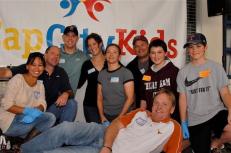Editor’s Note: For the homeless school kids in Austin whose basic living arrangements are transitory and unpredictable and whose ties to “normal” social systems and institutions are broken or, at best, tenuous, taking that first step through the front door of a school is a challenge in and of itself. But that first step is really only the beginning of a long set of stairs homeless children will need to climb to become successful adults.
CapCityKids is a nonprofit organization whose mission is to reconnect these kids to the education system so they have a chance at a quality education that will allow them to thrive—not only for themselves, but also for all of Austin. CapCityKids provides direct resources, supplies, support for teaching staff and tutoring, and assistance in finding other social resources and assistance, to help homeless kids succeed in school.
In this article, CapCityKids Board member and Mathews Elementary School Principal Amy Kinkade discusses the key challenges homeless children face in the classroom and how CapCityKids helps fill the gaps left by a life of chaos and crisis.
Success in school is more than a matter of giving children a book or putting them behind a desk. Children raised in a stable home environment typically have additional adult support in their studies and a safe place where they can concentrate and grow. Children raised in a stable home also tend to acquire the social and emotional competencies needed to handle themselves, their relationships, and their work effectively and ethically.
Homeless children, however, typically come from a life of crisis where they may have moved five times in one year. They are left to try to complete homework in a chaotic shelter never intended for children or families. Homeless children rarely see social and emotional competencies modeled consistently, if at all. CapCityKids provides support for educators across Austin to provide what is lacking in the chaos of homeless kids’ environments so they can participate effectively in school and, ultimately, participate successfully in our community.
One of the first things homeless children lack when they step into a classroom is a strong sense of self-awareness. Children raised in stable homes typically develop a trust that their parents love them, will be there, and will care for them. This environment sets children up to learn self-awareness, or an ability to accurately assess their feelings, interests, values, and strengths, and so to maintain a well-grounded sense of self-confidence.
This kind of environment and attachment rarely exists with a homeless child. If you have no attachments, then there is no drive to listen, pay attention, or follow through. Homeless children have to learn attachment—they have to see someone stick with it rather than cut and run. Often, a homeless child arrives at a new school famished, especially at the beginning. It is not really a nutritional hunger, but an “emptiness,” a need for nurturing and rest. I keep plenty of food in my office and often rock a child to sleep in my office.
CapCityKids provides tutors for our homeless children directly in the shelters, including the Salvation Army. Their tutors ensure a continuity of education and support after school hours. The CapCityKids tutor program shows our students that education can be a valuable part of their lives in school and out of school. Having a tutor who is dedicated to these children’s success also reinforces our efforts to instill attachment. Tutors provide another stable touch point and an adult who can motivate them to succeed no matter where they live.
Our second step with homeless children focuses on self-management, or helping them regulate their emotions so they can handle stress, control impulses, persevere in overcoming obstacles, set and monitor progress toward personal and academic goals, and express emotions appropriately.
When a child raised in a stable home encounters a problem, he or she may get angry, lie, act out, tell you “I don’t care”, shut down, and act like, well, a child. However, a child with a stable home has the resources to learn skills to overcome those obstacles. He or she may learn words or master new skills that offer alternatives to screaming and shutting down.
On the other hand, homeless children often have not mastered a foundation to respond to emotions. They may not be able to come up with the language to work it out or know how to regroup and try again. When they make a mistake or a bad choice, they do not know that you will still love them, even if you are angry. We work to make sure homeless children know we are partners with them in overcoming obstacles. We establish a trust first that we know they can make better choices.
CapCityKids also ensures that these children receive the additional resources to help master skills, gain confidence, and advance academically.
CapCityKids- innovative collaborations with AISD and the University of Texas at Austin provide social services to homeless high school students. CapCityKids funds a full-time social worker who supervises ten interns from UT. The Licensed Mastered Social Worker identifies academic, charitable, and government programs and services that give students the opportunity to sustain academic progress and graduate from high school. Laptops have been purchased and awarded to students who have displayed perseverance towards reaching their goals.
Math is a subject children often need reinforcement in to gain the skills and confidence necessary to advance. The math specialist at Mathews, funded by CapCityKids, has provided our at-risk students with the opportunity to master the math skills needed to progress successfully. These students’ success on the math portion of TAKS contributed significantly to our school being rated an Exemplary School.
Our third step that we work on with our homeless children is social awareness, or being able to empathize; recognize and appreciate individual and group similarities and differences; and recognize and use family, school, and community resources.
A child raised in a stable home arrives at school with a new backpack filled with pencils, paper, crayons, and other supplies. Not only are homeless children tired and hungry, they are likely unkempt. They have no backpack or supplies. They are weary of standing out as different. That pressure of being different, without a strong sense of self, can make classroom experiences almost unbearable for even the strongest of children.
CapCityKids ensures every homeless child has a fully loaded backpack. One of the first things homeless children do when they arrive is go shopping in our vault stocked by CapCityKids. These supplies give homeless children something that makes them feel like they look a bit more like the other students—that they have a badge to help them belong.
Once our children experience that sense of belonging, we can teach side-by-side empathy for everyone. All of our kids see everyone—homeless and stable—treated with lots of love and attention. We notice when someone has a new haircut or a shiny new pair of shoes. The children learn how to respond to others in pain, how to give space.
Our fourth step with homeless children relates to relationship skills, including cooperation; resisting inappropriate social pressure; preventing, managing, and resolving interpersonal conflict; and seeking help when needed.
Children in stable homes will learn how to develop healthy friendships and handle problems. They’ll begin to learn to think independently and follow a core set of values.
Homeless children’s relationships are more often than not based on chaos and crisis rather than healthy relationships. They will have no tools to stand up against peer pressure and will be unequipped to manage any disagreements.
We work with CapCityKids to provide the most all-encompassing loving and learning environment possible. A homeless child is here seven hours a day. We can help that child here at school in relationships with peers and teachers. CapCityKids also ensures an additional two hours or more a day of positive support via tutors and social workers within the shelters. Without these resources, a homeless child heads back to the shelter life of chaos. CapCityKids provides a continuity of healthy relationships throughout a homeless child’s life. Together, we provide over nine hours per day of nurturing, tutoring, counseling, and access to a regular weekly mentor. This cultivates long-term relationship skills for homeless children, not to mention the return on our direct investment in their education.
The final step we work on with our homeless children is responsible decision-making, including safety concerns, appropriate social norms, respect for others, consequences of various actions, and contributing to the well-being of one’s school and community.
A homeless child is at high risk of making poor choices, especially choosing to drop out of school. The choices from there on are grim. If we can keep homeless children moving up each developmental step, recognizing each step they take and equipping them with the tools to take new ones, we can help them continue to learn and succeed for a lifetime.
Schools and educators can show children these steps, but we cannot do it alone. In a stable home, parents can provide that support through modeling and consistency. But for children living in homelessness, that support is broken for them as well as for educators.
Our success rates when we provide homeless children these additional supports are astounding. A large number of the CapCityKids at Mathews have made the honor roll. Most of our homeless students receiving support and services are passing the TAKS test.
CapCityKids—through donations of direct supplies, tutors, social workers, and curriculum development—provides the supports that allow educators to teach the most vulnerable kids in our community. Their investment helps every child climb to the top of the stairs and succeed for themselves and our community. The mission and accomplishments of CapCityKids inspired me to take a more active role in the organization. When asked to serve on the Board, I enthusiastically agreed! The group of people at CapCityKids who have dedicated themselves to this worthy cause by volunteering, donating, and seeking other supporters are truly making a difference in the lives of many children.














